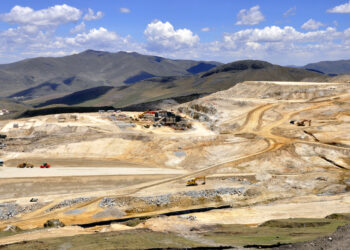Adelaide-based Renascor Resources (ASX: RNU) released a Definitive Feasibility Study for its Siviour graphite project near Arno Bay on South Australia’s Eyre Peninsula.
In a press release, Renascor said that the DFS confirms Siviour as one of the world’s leading graphite projects, both in terms of the tier-one quality of the resource and the projected low operating costs.
The development plan for the Siviour is based on a staged construction of two identical processing plants, each with an ore throughput capacity of 825,000 tonnes per annum for a combined capacity of 1,650,000 tonnes per annum
“Since beginning work on the DFS, we have aimed to deliver a project that would remain profitable through the highs and lows of the graphite market supply-demand cycle,” the company’s managing director, David Christensen, said in the media brief. “At A$471 (or US$330) operating costs per tonne of graphite concentrate produced during the first 10 years, Siviour will be located in the lowest quartile of the cost curve for international graphite projects.”
According to Christensen, over the same 10 year period, graphite produced at Siviour is expected to achieve an average of $881 per tonne based on independent forecasting.
The executive explained that the operation is planned to be built in two stages. The first stage will produce an average of 80ktpa of graphite concentrate for the first four years, before expanding to the second stage, which will see production increase to 144ktpa.
“In parallel, Renascor intends to advance its downstream spherical graphite production strategy, with a view to adding further value to the project by developing a downstream operation in South Australia to supply the growing lithium-ion battery industry,” Christensen said.
With the DFS now complete, Renascor says it will turn its attention to ramping up efforts to secure binding offtake agreements and debt and equity funding, while in parallel advancing its downstream spherical graphite production strategy.
“Our Siviour project is now well advanced, and we aim to secure binding offtake agreements, particularly within the lithium-ion battery supply chain,” the firm’s managing director said. “Just as rubber is needed for tires, graphite is a raw commodity required for anodes in batteries in electric vehicles. This mine will provide a product that literally drives innovative renewable technologies.”
The Siviour graphite project is located 15 kilometres from Arno Bay. It is flat and shallow and the biggest deposit in Australia. The mineral resource estimate is 87.4 million tonnes @ 7.5 per cent total graphite carbon for 6.6 million tonnes of contained graphite, with a probable reserve of 45.2 million tonnes @ 7.9 per cent for 3.6 million tonnes of contained graphite.
Adelaide-based Renascor Resources (ASX: RNU) released a Definitive Feasibility Study for its Siviour graphite project near Arno Bay on South Australia’s Eyre Peninsula.
In a press release, Renascor said that the DFS confirms Siviour as one of the world’s leading graphite projects, both in terms of the tier-one quality of the resource and the projected low operating costs.
The development plan for the Siviour is based on a staged construction of two identical processing plants, each with an ore throughput capacity of 825,000 tonnes per annum for a combined capacity of 1,650,000 tonnes per annum
“Since beginning work on the DFS, we have aimed to deliver a project that would remain profitable through the highs and lows of the graphite market supply-demand cycle,” the company’s managing director, David Christensen, said in the media brief. “At A$471 (or US$330) operating costs per tonne of graphite concentrate produced during the first 10 years, Siviour will be located in the lowest quartile of the cost curve for international graphite projects.”
According to Christensen, over the same 10 year period, graphite produced at Siviour is expected to achieve an average of $881 per tonne based on independent forecasting.
The executive explained that the operation is planned to be built in two stages. The first stage will produce an average of 80ktpa of graphite concentrate for the first four years, before expanding to the second stage, which will see production increase to 144ktpa.
“In parallel, Renascor intends to advance its downstream spherical graphite production strategy, with a view to adding further value to the project by developing a downstream operation in South Australia to supply the growing lithium-ion battery industry,” Christensen said.
With the DFS now complete, Renascor says it will turn its attention to ramping up efforts to secure binding offtake agreements and debt and equity funding, while in parallel advancing its downstream spherical graphite production strategy.
“Our Siviour project is now well advanced, and we aim to secure binding offtake agreements, particularly within the lithium-ion battery supply chain,” the firm’s managing director said. “Just as rubber is needed for tires, graphite is a raw commodity required for anodes in batteries in electric vehicles. This mine will provide a product that literally drives innovative renewable technologies.”
The Siviour graphite project is located 15 kilometres from Arno Bay. It is flat and shallow and the biggest deposit in Australia. The mineral resource estimate is 87.4 million tonnes @ 7.5 per cent total graphite carbon for 6.6 million tonnes of contained graphite, with a probable reserve of 45.2 million tonnes @ 7.9 per cent for 3.6 million tonnes of contained graphite.
Adelaide-based Renascor Resources (ASX: RNU) released a Definitive Feasibility Study for its Siviour graphite project near Arno Bay on South Australia’s Eyre Peninsula.
In a press release, Renascor said that the DFS confirms Siviour as one of the world’s leading graphite projects, both in terms of the tier-one quality of the resource and the projected low operating costs.
The development plan for the Siviour is based on a staged construction of two identical processing plants, each with an ore throughput capacity of 825,000 tonnes per annum for a combined capacity of 1,650,000 tonnes per annum
“Since beginning work on the DFS, we have aimed to deliver a project that would remain profitable through the highs and lows of the graphite market supply-demand cycle,” the company’s managing director, David Christensen, said in the media brief. “At A$471 (or US$330) operating costs per tonne of graphite concentrate produced during the first 10 years, Siviour will be located in the lowest quartile of the cost curve for international graphite projects.”
According to Christensen, over the same 10 year period, graphite produced at Siviour is expected to achieve an average of $881 per tonne based on independent forecasting.
The executive explained that the operation is planned to be built in two stages. The first stage will produce an average of 80ktpa of graphite concentrate for the first four years, before expanding to the second stage, which will see production increase to 144ktpa.
“In parallel, Renascor intends to advance its downstream spherical graphite production strategy, with a view to adding further value to the project by developing a downstream operation in South Australia to supply the growing lithium-ion battery industry,” Christensen said.
With the DFS now complete, Renascor says it will turn its attention to ramping up efforts to secure binding offtake agreements and debt and equity funding, while in parallel advancing its downstream spherical graphite production strategy.
“Our Siviour project is now well advanced, and we aim to secure binding offtake agreements, particularly within the lithium-ion battery supply chain,” the firm’s managing director said. “Just as rubber is needed for tires, graphite is a raw commodity required for anodes in batteries in electric vehicles. This mine will provide a product that literally drives innovative renewable technologies.”
The Siviour graphite project is located 15 kilometres from Arno Bay. It is flat and shallow and the biggest deposit in Australia. The mineral resource estimate is 87.4 million tonnes @ 7.5 per cent total graphite carbon for 6.6 million tonnes of contained graphite, with a probable reserve of 45.2 million tonnes @ 7.9 per cent for 3.6 million tonnes of contained graphite.
Adelaide-based Renascor Resources (ASX: RNU) released a Definitive Feasibility Study for its Siviour graphite project near Arno Bay on South Australia’s Eyre Peninsula.
In a press release, Renascor said that the DFS confirms Siviour as one of the world’s leading graphite projects, both in terms of the tier-one quality of the resource and the projected low operating costs.
The development plan for the Siviour is based on a staged construction of two identical processing plants, each with an ore throughput capacity of 825,000 tonnes per annum for a combined capacity of 1,650,000 tonnes per annum
“Since beginning work on the DFS, we have aimed to deliver a project that would remain profitable through the highs and lows of the graphite market supply-demand cycle,” the company’s managing director, David Christensen, said in the media brief. “At A$471 (or US$330) operating costs per tonne of graphite concentrate produced during the first 10 years, Siviour will be located in the lowest quartile of the cost curve for international graphite projects.”
According to Christensen, over the same 10 year period, graphite produced at Siviour is expected to achieve an average of $881 per tonne based on independent forecasting.
The executive explained that the operation is planned to be built in two stages. The first stage will produce an average of 80ktpa of graphite concentrate for the first four years, before expanding to the second stage, which will see production increase to 144ktpa.
“In parallel, Renascor intends to advance its downstream spherical graphite production strategy, with a view to adding further value to the project by developing a downstream operation in South Australia to supply the growing lithium-ion battery industry,” Christensen said.
With the DFS now complete, Renascor says it will turn its attention to ramping up efforts to secure binding offtake agreements and debt and equity funding, while in parallel advancing its downstream spherical graphite production strategy.
“Our Siviour project is now well advanced, and we aim to secure binding offtake agreements, particularly within the lithium-ion battery supply chain,” the firm’s managing director said. “Just as rubber is needed for tires, graphite is a raw commodity required for anodes in batteries in electric vehicles. This mine will provide a product that literally drives innovative renewable technologies.”
The Siviour graphite project is located 15 kilometres from Arno Bay. It is flat and shallow and the biggest deposit in Australia. The mineral resource estimate is 87.4 million tonnes @ 7.5 per cent total graphite carbon for 6.6 million tonnes of contained graphite, with a probable reserve of 45.2 million tonnes @ 7.9 per cent for 3.6 million tonnes of contained graphite.














